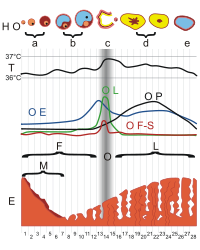
Photo from wikipedia
BACKGROUND Dysmenorrhea is the most common gynecologic complaint among adolescent and adult females. Some dysmenorrheic females do not respond to treatment with NSAIDs or oral contraceptives and exhibit contraindications to… Click to show full abstract
BACKGROUND Dysmenorrhea is the most common gynecologic complaint among adolescent and adult females. Some dysmenorrheic females do not respond to treatment with NSAIDs or oral contraceptives and exhibit contraindications to such medications. Therefore, alternative medication gained importance in management of dysmenorrhea. METHODS A comparative clinical trial was conducted on thirty-one dysmenorrheic subjects, who were randomly assigned to three groups. The dosage was 1gr/day, 3gr/day and 3gr/day for Ginger, Dill seeds, and Cumin, respectively. The girls in respective group consumed the spice for three days during each cycle for three consecutive cycles. RESULTS Dill seed was effective in reducing pain, followed by ginger wherein Cumin did not exhibit any effect. Cumin exhibited significant reduction in systemic responses like cold sweats, backache, fatigue and cramps. CONCLUSION Dill seeds were more effective in reducing pain. It was obvious from our study that reducing symptoms is also important in the overall management of dysmenorrhea.
Journal Title: Complementary therapies in clinical practice
Year Published: 2019
Link to full text (if available)
Share on Social Media: Sign Up to like & get
recommendations!